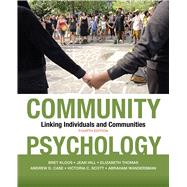The fourth edition of this acclaimed textbook provides an in-depth and engaging overview of community psychology, including its theoretical underpinnings and methods for conducting research and promoting change within communities. This book aims to get students, including nonpsychology majors, excited about the field and being agents of social change.
New to this edition are an increased focus on values, particularly those related to social justice, empowering minority communities, and solving complex societal problems—like poverty, oppression, and climate change—across multiple ecological levels.
New research and case examples present important developments in the field and society at large, accompanied by extensive discussion questions that will encourage self-reflection and help students apply key concepts to their own lives. A new marginal glossary also highlights important concepts.
Chapter summaries, recommended videos and other resources, review questions, sample lecture slides, and other materials for students and instructors are available on the book’s companion website (http://pubs.apa.org/books/supp/kloos4/).









